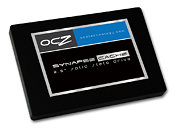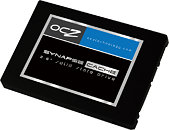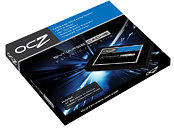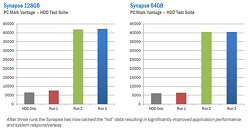Wednesday, September 21st 2011

OCZ Technology Introduces Synapse Cache Series SSDs for High-Performance Caching
OCZ Technology Group, Inc., a leading provider of high-performance solid-state drives (SSDs) for computing devices and systems, today launched its Synapse Cache Series 2.5" SSDs. The new Synapse SSDs are optimized for caching applications and leverages Dataplex cache software to dynamically manage the Synapse SSD in conjunction with standard hard disk drives (HDDs), to provide users with SSD-level performance across the entire capacity of the HDD.
"The industry has shown that it craves the performance advantages that SSDs provide, however, many users still value the high capacities associated with HDDs," said Tobias Brinkmann, Director of Product Management, OCZ Technology Group. "We see the Synapse Cache SSDs integrated with Dataplex software as a big win for a large number of customers who value SSD performance but still require HDD capacity. We are proud to be the first to offer this no-compromise approach to enabling high-performance and high-capacity storage for virtually any PC platform."This comprehensive caching solution prioritizes the most frequently/recently used "hot" data on the Synapse Cache SSD, while "cold," less frequently used data is stored on the larger capacity HDD. The OCZ Synapse series features the latest and most advanced hardware and software technology to deliver superior storage performance without sacrificing HDD capacity.OCZ Synapse Cache SSDs are available now in 2.5" SATA III 64GB and 128GB configurations throughout the company's global channel.
"The industry has shown that it craves the performance advantages that SSDs provide, however, many users still value the high capacities associated with HDDs," said Tobias Brinkmann, Director of Product Management, OCZ Technology Group. "We see the Synapse Cache SSDs integrated with Dataplex software as a big win for a large number of customers who value SSD performance but still require HDD capacity. We are proud to be the first to offer this no-compromise approach to enabling high-performance and high-capacity storage for virtually any PC platform."This comprehensive caching solution prioritizes the most frequently/recently used "hot" data on the Synapse Cache SSD, while "cold," less frequently used data is stored on the larger capacity HDD. The OCZ Synapse series features the latest and most advanced hardware and software technology to deliver superior storage performance without sacrificing HDD capacity.OCZ Synapse Cache SSDs are available now in 2.5" SATA III 64GB and 128GB configurations throughout the company's global channel.




21 Comments on OCZ Technology Introduces Synapse Cache Series SSDs for High-Performance Caching
I wonder if this is basically a Vertex III with the Synapse Cache "upgrade"?
The only downside I see is if the dataset is changing frequently the memory modules will wear faster than a SSD, where a SSD just has to read from a different area instead of recaching new data.
an interesting concept would be a caching-ssd wich works completely in hardware where you connect your hdd to a dedicated sata port on the caching-ssd and this caching-ssd reports to the os/pc as if it were the connected hdd itself, completely hiding the caching-stuff from the user/os. no stupid software wich can fail by itself.
There could also be some sort of firmware optimization with this, but that seems unlikely as Sandforce provides their own firmware, and it doesn't sound like Indilinx's new Everest controller will be out any time soon.
Edit: I just did a little bit of research and found that these drives have 50% overprovisioning for wear leveling. I honestly don't see how this would increase the lifespan, though. More OP means less cache space and more data being pushed out and being deleted and later rewritten. I'm sure the people over at OCZ know more about these things than I do, though, so I'll defer to their judgement.
I need 3TB of Data space... Even if SSDs of 1TB come down to 300$+, 3B will cost 1000$ vs the 99.99$ it will cost in HDDs. 10x the price
3.5" floppy?
CD?
DVD?
BD?
over time, all these techs get phased out. hard drives themselves will always exist, but the internals - from magnetic to flash memory, is almost certainly going to happen.
the very day that SSD's becomes as cheap as mechanical drivers per GB to customers, is the day mechanical drives die off.
btw: i guess 50% overprovisioning is needed to maintain performance because this drive is mainly used as cache and as such it could get a lot of writes (unlike an ssd used as a system drive).
I have all my videos, music, photos, games, and backups on a whole other array. I would rather have a cache drive that is made of DRAM chips, but we can already do that with a RAM drive, and its cheap.
I looked on there home page but didn't see any pricing.
OCZ Synapse Cache 64GB SYN-25SAT3-64G
OCZ Synapse Cache 128GB SYN-25SAT3-128G
Newegg has also added the Hybrid RevoDrive 100GB SSD + 1TB HDD (5400RPM) for $499.99 + Shipping.
OCZ RevoDrive RVDHY-FH-1T PCI-E 100GB SSD+1TB HDD (5400RPM)
*Update*
ComputerWorld.com released an article today that says the retail price for the 64GB version will be $149 and the retail price for the 128GB version will be $249.
OCZ's Synapse SSD to boost hard drive performance by auto-caching